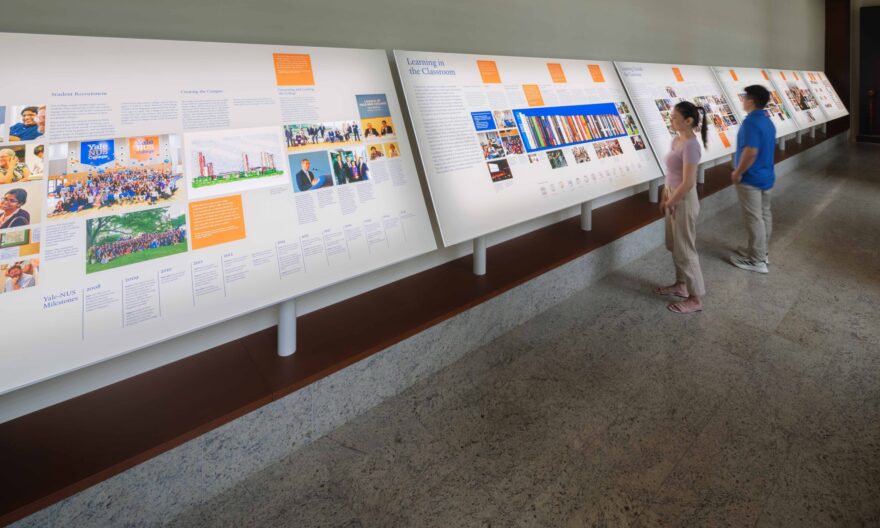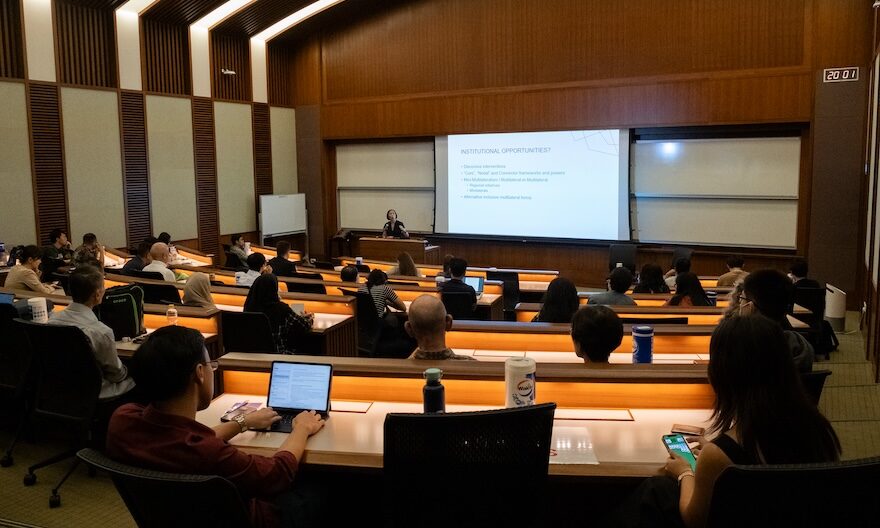Nobel laureate Carl Wieman advocates for revolutionary approaches in science education

On 28 April 2017, Nobel laureate and renowned educator Professor Carl Wieman presented a public lecture as a part of the President’s Speaker Series at Yale-NUS College. Prof Wieman is a physicist at Stanford University and was awarded the Nobel Prize in Physics in 2001 for producing the first Bose-Einstein condensate.
In his presentation, “Taking a Scientific Approach to Science Education”, Prof Wieman discussed new approaches for teaching and learning which can result in a more robust and relevant approach to science education in the 21st century.
Prof Wieman holds joint appointments as Professor of Physics and Professor of the Graduate School of Education in Stanford University. He completed his undergraduate studies at the Massachusetts Institute of Technology (MIT) and his PhD at Stanford University in 1977. In addition to receiving the Nobel Prize, Prof Wieman was named one of the United States Professors of the Year in 2004 for his work on the advancement of teaching.
During his lecture, Prof Wieman recounted how science has advanced rapidly due to new experimental practices and data whereas science education has remained largely outdated and inefficient. He advocated for an approach in which scientists could think about their disciplines and pass it on students.
Stressing the importance of teaching students how to think like a scientist, Prof Wieman said, “Meaningful science education is about gaining science knowledge to make decisions and choices, not just the memorisation of knowledge”.
Bryan Penprase, Professor of Physics and Director of the Centre for Teaching and Learning at Yale-NUS, said, “Prof Wieman has tirelessly researched ways to increase effectiveness of teaching and his work has created new curricula and methods of teaching in several leading US universities.”
Prof Wieman advocated for a data-driven approach that incorporates major advances of the past two decades in multiple fields such as cognitive psychology, neuroscience and education studies to improve how science is taught to students. Citing multiple studies that he conducted and studies from other researchers on classroom learning, Prof Wieman discussed the impact that his recommended initiatives have had in improving student engagement, satisfaction and attendance at Stanford University and other higher education institutions in the US.
Jerrick Wee (Class of 2019) was impressed by Prof Wieman’s emphasis on the teacher to be a great motivator for students, even at the university level. He said, “I am surprised to learn that students who had scored well in school are clueless when they enter the workforce. I always thought having a strong theoretical grasp of an academic subject would naturally bring about detailed knowledge on its content and research proficiency, so that was quite interesting to hear.”
Drawing from his experience, Jerrick remarked that Yale-NUS, being a small college with less of a burden of tradition, is well positioned to take advantage of the advances in pedagogical methods in the sciences. He added that Prof Wieman’s insights could be particularly useful to the College’s approach in teaching the sciences.

Speaking about the importance of having a new approach to science education, Prof Penprase said, “This will enable students to provide thoughtful and reasoned discourse that merges the sensitivity toward intercultural difference and nuances argument with rigorous scientific calculations and complex data. This type of breadth and rigour is sadly missing across the public debates in today’s media and politics. A Yale-NUS education can help provide clarity, sensitivity and insight by drawing upon the multiple perspectives of humanities, social sciences and science.”
In his closing remarks, Prof Wieman emphasised the benefits of a scientific approach to teaching, which greatly improves both student learning and faculty enjoyment of teaching.
Prof Wieman’s speech was also the closing event for the STEM Singapore Innovation Symposium 2017, which aimed to enable educators to improve their teaching methods in order to prepare their students to engage with the complex problems of the 21st century. Discussion topics included what an interdisciplinary STEM curriculum is like, the role of technology in STEM education as well as the challenges and solutions of teaching mathematics and quantitative reasoning. University educators from around Singapore including Yale-NUS, Nanyang Technological University, National University of Singapore and Singapore University of Technology and Design attended the two-day symposium.




